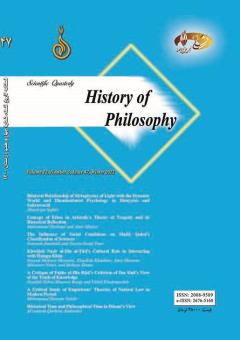Historical Time and Philosophical Time in Ibrahimi Dinani’s View
Subject Areas : Connection of philosophers’ views and philosophical schools with the social and philosophical conditions of the timeM‘asumeh Qorbani Anderehci 1 *
1 - PhD candidate of Islamic Philosophy and Kalam, Islamic Azad University, Science and Research Branch, Tehran, Iran
Keywords: Time, motion, Thought, consciousness, Gholam Hossein Ibrahimi Dinani,
Abstract :
Perception of time is of an intellectual nature, and the human mind can easily divide it into seconds and minutes, for example, and measure it. However, when speaking of the truth of time, one is in fact faced with a complex and difficult mystery. The attempts at disambiguating this mystery has resulted in wide-spread disagreements among philosophers and thinkers so that some of them hold that time exists while some others deny its existence. Gholam Hossein Ebrahimi Dinani, a contemporary Iranian thinker, conceives of time as an ontological entity. He has reanalyzed and reinterpreted the views of several thinkers regarding time and believes that everything in the world of being is manifested and emerges through the channel of human consciousness. He emphasizes that the relationship between Man and time is so strong that its rupture is meaningless. Dinani maintains that time has two dimensions: one is the material dimension, which is realized in the material world, and the other is the Ideal dimension, which is indeed perceived as a path towards the world of meaning. The latter, while being material, is of an Ideal nature. In his view, time in its material dimension is the same as the measure of motion, and time in the world of thought is identical with the form of human perception.
ابراهیمی دینانی، غلامحسین (1393) معمای زمان و حدوث جهان، تهران: مؤسسه پژوهشی حکمت و فلسفه ایران.
ابراهیمی دینانی، غلامحسین (1394) «من» و جز »من»، تهران: مؤسسه پژوهشی حکمت و فلسفه ایران.
ابراهیمی دینانی، غلامحسین (1395) پرسش از هستی و هستیِ پرسش، تهران: مؤسسه پژوهشی حکمت و فلسفه ایران.
ابنسینا، حسین (1385) اشارات و تنبیهات، شرح حسن ملکشاهی، تهران: سروش.
ابنسینا (1364) النجاة، تحقيق محمدتقی دانشپژوه، تهران: دانشگاه تهران.
ابنسینا (1405ق) الشفا، الطبیعیات، قم: كتابخانه آیةالله العظمی مرعشی نجفی.
ابوريان، محمدعلی (1366) مبانی فلسفه اشراق از دیدگاه سهروردی، ترجمه محمدعلي شيخ، تهران: حکمت.
ارسطو (1363) طبیعیات، ترجمة مهدی فرشاد، تهران: امیرکیبر.
ارسطو (1378) متافیزیک، ترجمة محمدحسن لطفی، تهران: طرح نو.
افلاطون (بیتا) تیمائوس، ترجمة محمدحسن لطفی، تهران: بینا.
بغدادی، ابوالبرکات (1358ق) المعتبر فی الحکمة، حيدرآباد: دایرةالمعارف عثمانیه.
خراسانی، شرفالدین (1350) نخستین فیلسوفان یونان، شیراز: جنگل.
سهروردی (1380) مجموعه مصنفات شيخاشراق، تهران: پژوهشگاه مطالعات و تحقیقات علوم انسانی.
کاپلستون، فردریک (1380) تاریخ فلسفه، ج1: يونان و روم، ترجمه جلالالدین مجتبوی، تهران: علمی و فرهنگی.
ملاصدرا (1383) الحكمة المتعالية فی الأسفار الأربعة، ج3: تصحیح و تحقيق مقصود محمدی، تهران: بنیاد حکمت اسلامی صدرا.

